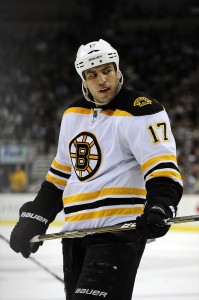In some situations, fighting fire with fire is a viable strategy. When playing the Boston Bruins, this option will end up in second-degree burns.
Amidst the third round of the 2013 playoffs, the Boston Bruins have certainly had their ups and downs. They managed to pull off an epic comeback against the Leafs to avoid a large collapse of their own, and proceeded to win eight of their next nine games against the Rangers and Penguins. In fact, the only time this team has faced true adversity was during the final six games of their first round series with Toronto. Besides that, the road to the finals has been smooth sailing for the B’s.
Everybody that watches the sport knows the way that Boston plays hockey, and how they’ve had this incredible run in the playoffs. Their success is not dependent on the pure skill or speed of noteworthy superstars, or an offensive-defenseman that controls play out of the defensive zone. The Bruins’ success as a hockey team does not boil down to a fast break by Tyler Seguin or the hard slapshots of Johnny Boychuk.

Rather, the way the Bruins win hockey games is by playing physical and with a mean-streak. Playing Boston is one of the most mentally and physically straining things that a team can do in a season. Their players are punishing and merciless, headlined by a hulking Milan Lucic and Zdeno Chara, who are physical freaks of nature and absolutely terrifying to face. Their defence is forceful and edgy, with Boychuk, Dennis Seidenberg, and Andrew Ference letting their opponents know that gaining the offensive zone is no easy task. Their depth forwards are reliable and gritty, as Shawn Thornton, Daniel Paille, Gregory Campbell, and Rich Peverley are among the guys that work every shift they get, and with a rare combination of grit, speed, and size are able to grind out a shift regardless of the situation they are forced into.
Finally, the Bruins are (in the most respectful way that this word can be used) jerks. The Boston Bruins are a mean team, and they know it. No shift goes without a subtle (or not-so-subtle) slash to the back of the knee or punch to the shoulder. The play doesn’t end until the whistle has blown loud and clear, or referees break up the willing combatants wearing black and yellow. Shifts are ended by a shove or some insults hurled at their opponents, and this will continue for almost an entire game. Boston has adopted a new style of game through this play, which is being coined as “Bruins Hockey”.
It is called Bruins hockey because the Boston Bruins excel at playing an intimidating, mean, hard-hitting, and grinding game that effectively tires and angers their opponents. It is not called “Penguins Hockey”, “Maple Leafs Hockey”, or “Rangers Hockey” because those teams do not have the philosophical mindset, nor the team complexion to play in such a way. Not once this season has anyone ever commented on how Pittsburgh’s physical presence wins them games. Rather, they win games from the overwhelming talent of their forwards. Derek Engelland’s and Matt Cooke’s physical styles hardly ever win them hockey games. Every team has a way that they play hockey, and especially for those in the playoffs these playing styles worked for them in a long, grueling regular season.
But for some reason, when teams face the Boston Bruins in the Stanley Cup Playoffs, their number one priority is to match the Bruins’ style of play. Teams built on speed resort to a physical dump-and-chase method to enter the zone. Players who never involve themselves in activity after the whistle feel the need to lay an insult or throw a punch. Skilled players are replaced with stronger ones. Teams don’t focus on exploiting the Boston Bruins’ weaknesses, such as the foot speed of both their forwards and defensemen. Instead, the main priority of the game is to match Boston’s biggest strength, which is their physical presence and ability to infuriate all players.
Every time a team tries to do this in the playoffs, it fails miserably. In the 2011 Cup Final, the Vancouver Canucks let Brad Marchand and the Bruins knock them

off of their game, effectively winning the franchise’s first Stanley Cup win since the 1970s. Since then, teams have let the B’s physical style dictate the way that they play hockey. The Canucks traded for Zach Kassian in an attempt to get bigger and meaner. The Sabres, who were embarrassed by Milan Lucic and his bodycheck on Miller, aimed to get more physical and bigger in the offseason, sacrificing talent for size. And in the 2013 Playoffs, the Penguins seemed to be more focused on showing the Bruins how physical they were willing to be, forgetting that actual hockey had to be played and were subsequently throttled in a 4-0 sweep. The only team that stood a chance in the playoffs were the Toronto Maple Leafs, who switched back to a game built on speed and talent after a 4-1 thrashing in game one, where the Leafs sat talented guys like Gardiner and MacArthur for bigger bodies such as Kostka and McLaren.
On Wednesday, the Chicago Blackhawks will be the final opponent of the Boston Bruins in the 2013 Stanley Cup Playoffs. The Hawks will not win the series by attempting to “out-Bruin” the Bruins. Jamal Mayers and Andrew Shaw will not dictate the tempo of the series through intimidation, because Lucic, Marchand, Thornton, Chara, and the rest of the team will have no problem feeding off of the physicality. Rather, the Hawks will need to rely on good goaltending from Cory Crawford. Patrick Kane will need to be in top form and Jonathan Toews will need to stray away from the frustration that he showed against the Red Wings. Hossa and Sharp will need to be threats offensively, allowing for the depth of the Blackhawks to take advantage of the Bruins’ lower defensive pairings. Essentially, the Blackhawks must stick to their game and not allow themselves to let Boston’s play decide how they play.
Against the Bruins, teams cannot fight fire with fire. Don’t let their physicality, size, and toughness dictate how others play hockey. If that happens, the Bruins win every time. Rather, for the Blackhawks to win their final against the Boston Bruins, they must fight fire with water. They must use speed, positioning, and just a dash of truculence if they want to win the Stanley Cup. If they fall victim to the Bruins’ trap, just like teams have in the past, it will be Boston who will be lifting the Cup for the second time in three years.